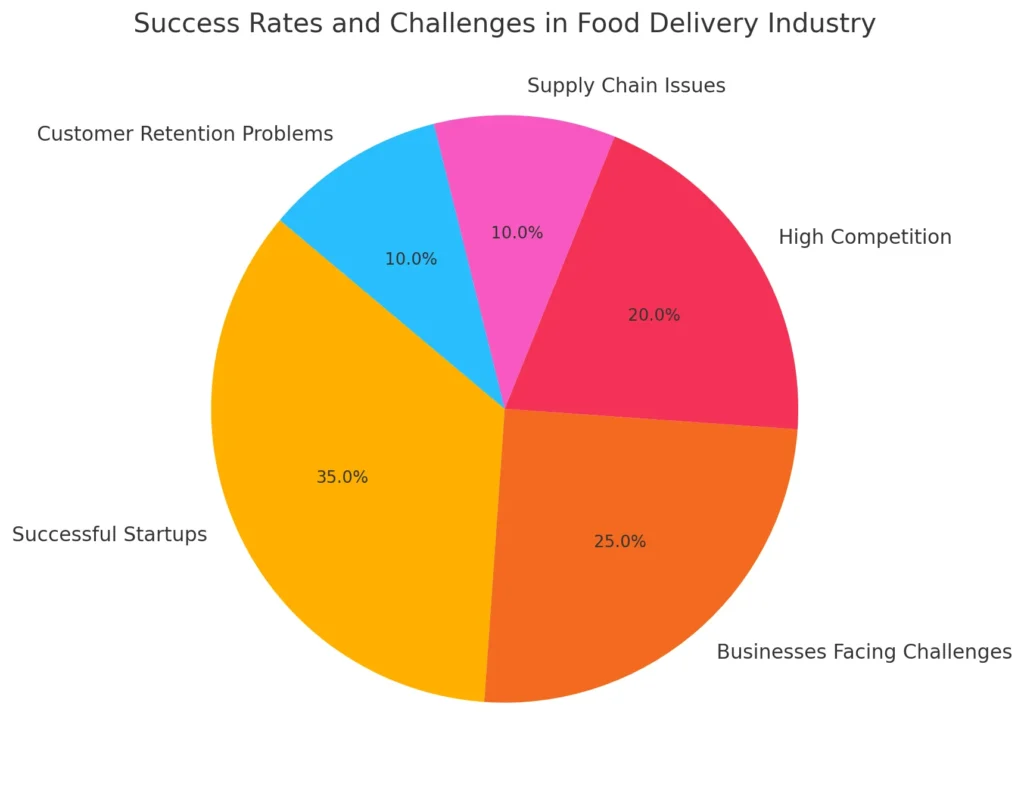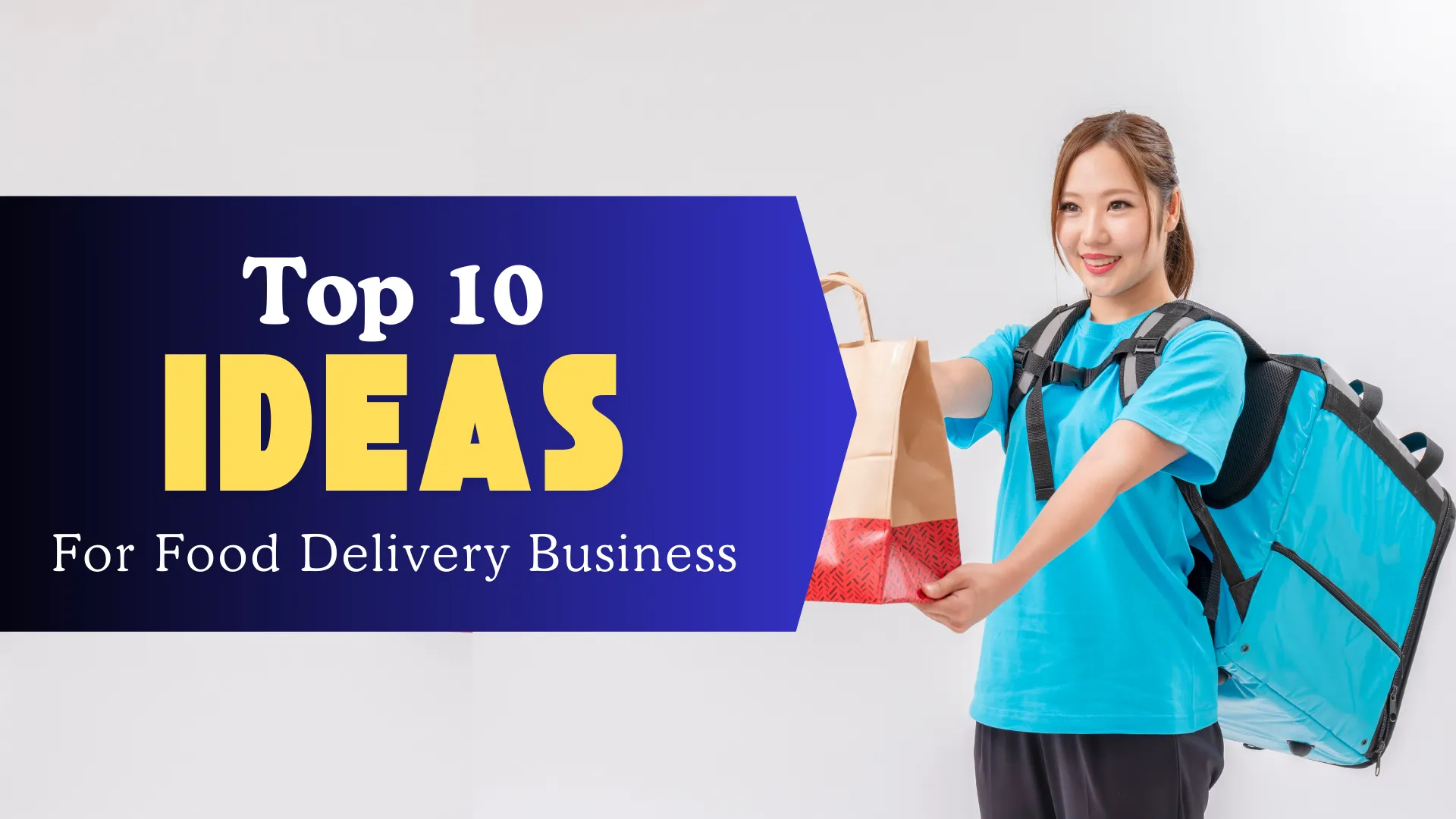The food delivery industry is booming like never before. With busy lifestyles, a growing demand for convenience, and a vast array of cuisine choices, people are turning to food delivery options more than ever. This surge is reshaping the dining experience, making it an ideal time for aspiring entrepreneurs to enter the market.
Whether you’re looking to deliver gourmet meals, cater to niche diets, or provide ultra-fast service, there’s ample opportunity for innovative ideas in this sector. By exploring these top 10 food delivery business ideas, you’ll gain insight into what makes this industry thrive and discover potential pathways to make a mark in 2024’s food delivery landscape.
Why Choose the Food Delivery Industry?
The food delivery industry has become one of the most dynamic sectors in the modern market. As people juggle hectic schedules, the convenience of having meals delivered to their doorsteps has become a necessity rather than a luxury. This surge in demand makes the industry a lucrative choice for aspiring entrepreneurs looking to build a successful business in a sector with sustained growth potential. Food delivery isn’t just about convenience; it also brings opportunities to cater to diverse preferences, from organic and health-conscious meals to gourmet and international cuisines.
Furthermore, the industry’s growth potential is backed by promising projections. In the past few years, food delivery services have grown at an impressive rate, showing resilience and adaptability even during economic shifts. This momentum is expected to continue, fueled by trends such as eco-friendly packaging, tech-enabled ordering solutions, and an expanding range of food options that appeal to a broad audience. Entering the food delivery industry now means tapping into a robust market with endless possibilities to innovate and stand out.
Current Trends and Future Opportunities in Food Delivery
| Tendencia/Tecnología | Descripción | Impacto potencial |
|---|---|---|
| Technology-Driven Ordering | Use of mobile apps, AI recommendations, and user-friendly interfaces for a smoother experience. | Enhances customer convenience and personalization, increasing customer satisfaction. |
| Sustainable Practices | Adoption of eco-friendly packaging, waste reduction, and local sourcing. | Attracts eco-conscious consumers and strengthens brand reputation. |
| Niche Market Offerings | Catering to specific dietary preferences (plant-based, keto, etc.) and international cuisines. | Taps into underserved markets, increasing customer loyalty and broadening market reach. |
| Quick Delivery Solutions | Implementation of on-demand delivery with shorter waiting times. | Meets the demand for faster service, improving competitiveness. |
| Subscription and Loyalty Models | Offering subscriptions or loyalty programs for regular customers. | Encourages repeat orders, building a loyal customer base. |
The food delivery landscape is constantly evolving, with new trends reshaping how businesses operate and how customers order. One of the most significant trends is the rise of technology-driven ordering experiences. From mobile apps with seamless interfaces to AI-driven recommendations, technology is enhancing convenience and personalization, making it easier for customers to find exactly what they want. For entrepreneurs, adopting these technologies means meeting customer expectations while gaining a competitive edge.
Another emerging trend is the focus on sustainability. As customers become more eco-conscious, they are looking for businesses that prioritize environmentally friendly practices. This includes biodegradable packaging, waste reduction initiatives, and partnerships with local farms for fresh, sustainable ingredients. Integrating these practices can not only attract customers but also position a business as a responsible, future-oriented brand.
Looking forward, there’s also an increasing demand for niche options within the food delivery market. From plant-based menus to international cuisines and specialized dietary options, people crave variety and authenticity. New startups have the chance to explore unique themes and cater to specific customer needs, establishing themselves in untapped segments. By keeping an eye on these trends and seizing future opportunities, entrepreneurs can create a food delivery business that resonates with modern consumer demands and stands out in a growing market.
Las 10 mejores ideas para empresas emergentes de entrega de comida
The food delivery sector offers endless opportunities for entrepreneurs with creative ideas and a focus on customer satisfaction. Here are ten compelling business ideas tailored to meet various market needs, each with its own unique appeal, startup requirements, and profit potential.
| Food Delivery Business Idea | Costo inicial estimado | Mercado objetivo | Potencial de ganancias |
|---|---|---|---|
| Healthy Meal Delivery | Moderado | Health-conscious individuals and fitness enthusiasts | High, with growing demand for healthy options |
| Gourmet Meal Delivery | Alto | Busy professionals, foodies, and high-end customers | High, particularly in urban areas |
| Ethnic Cuisine Specialties | Moderado | Customers seeking authentic, culturally diverse foods | Moderate to high, with niche appeal |
| Meal Kits for Home Cooks | Moderado a alto | Families and busy individuals interested in cooking | High, with potential for repeat orders |
| Subscription-Based Meal Services | Moderado | Long-term customers seeking meal plans | High, due to recurring revenue model |
| Office and Corporate Catering | Alto | Corporates, offices, and event organizers | High, especially in business hubs |
| Late-Night Food Delivery | Bajo a moderado | Night owls, shift workers, late-night cravers | Moderate to high, with limited competition |
| Diet-Specific Meal Plans | Moderado | Customers with specific dietary needs | High, catering to a loyal customer base |
| Desserts and Sweets Delivery | Bajo a moderado | Customers with a sweet tooth, event planners | Moderate, with seasonal spikes |
| Farm-to-Table Meal Delivery | Moderado a alto | Eco-conscious customers valuing sustainability | High, with strong appeal to eco-minded clientele |
1. Healthy Meal Delivery
Deliver health-conscious meals with balanced, diet-friendly options, perfect for fitness enthusiasts and health-conscious customers.
- Focus: Keto, vegan, organic meal plans
- Mercado objetivo: Health-focused customers, fitness enthusiasts
2. Gourmet Meal Delivery
Provide high-quality, gourmet meals for special occasions or indulgent dining, catering to busy professionals and food connoisseurs.
- Focus: Gourmet and high-end dining experiences
- Mercado objetivo: Professionals, food lovers
3. Ethnic Cuisine Specialties
Deliver authentic dishes from specific cultures or regions, ideal for customers seeking unique culinary experiences.
- Focus: Mediterranean, Thai, Indian, and other regional cuisines
- Mercado objetivo: Culture-focused and adventurous foodies
4. Meal Kits for Home Cooks
Offer pre-measured ingredients and recipes, allowing customers to cook fresh meals at home without meal prep hassle.
- Focus: DIY cooking with step-by-step recipes
- Mercado objetivo: Busy families, home cooks
5. Subscription-Based Meal Services
Weekly or monthly meal subscriptions tailored to customer preferences, boosting customer retention and revenue.
- Focus: Subscription-based model with personalized meals
- Benefit: Recurring revenue, customer loyalty
6. Office and Corporate Catering
Specialize in meals for offices, meetings, and events, targeting urban businesses and professionals.
- Focus: Corporate and office catering
- Mercado objetivo: Businesses, professional offices
7. Late-Night Food Delivery
Late-hour food delivery for night owls, shift workers, or those with cravings, offering a niche with limited competition.
- Focus: Late-night and overnight delivery
- Advantage: High demand, low competition
8. Diet-Specific Meal Plans
Offer meals catering to specific dietary needs, serving those with health conditions or dietary restrictions.
- Focus: Gluten-free, diabetic-friendly, allergen-free
- Mercado objetivo: Health-conscious, dietary restriction customers
9. Desserts and Sweets Delivery
Deliver a variety of desserts, perfect for sweet cravings, celebrations, and special events.
- Focus: Cakes, pastries, ice creams
- Mercado objetivo: Sweet lovers, celebratory occasions
10. Farm-to-Table Meal Delivery
Emphasize fresh, seasonal ingredients from local farms, appealing to eco-conscious and sustainability-focused customers.
- Focus: Farm-sourced, seasonal ingredients
- Mercado objetivo: Eco-friendly, sustainability-conscious customers
Ejemplos del mundo real

In recent years, several food delivery startups have achieved remarkable success, showcasing what’s possible with innovative ideas and a strong customer focus. These examples highlight the various paths entrepreneurs can take within the food delivery industry, each catering to unique market needs and demonstrating growth potential despite competitive challenges.
For instance, a few startups have found success by focusing on sustainable practices, integrating eco-friendly packaging and local sourcing. This approach has resonated with environmentally conscious customers, building a loyal customer base and a strong brand identity. Others have tapped into the demand for specialized diets, offering meal plans tailored to gluten-free, vegan, or allergen-free requirements. By positioning themselves as reliable and health-conscious, these businesses have carved out a profitable niche.
Additionally, companies targeting corporate catering have thrived by providing reliable, high-quality food delivery services to businesses and offices. Their success lies in consistent, timely deliveries and customizable options that suit different corporate needs, from daily lunches to event catering.
These examples show that with the right strategy, focusing on a clear target market, and adapting to customer expectations, food delivery startups can find long-term success and profitability.
Mistakes to Avoid When Starting a Food Delivery Business
| Error común | Descripción | Medida preventiva |
|---|---|---|
| Subestimar los costos iniciales | Failing to budget accurately, leading to unexpected expenses. | Create a detailed budget covering all operational costs. |
| Overlooking Customer Service | Inconsistent service can result in negative reviews and lost customers. | Invest in reliable delivery systems and responsive support. |
| Ignorar las preferencias del cliente | Not adapting to changing trends, limiting market appeal. | Regularly monitor industry trends and adjust offerings as needed. |
| Lack of Scalability Planning | Struggling to meet demand as the business grows, affecting quality. | Prepare infrastructure for scaling to handle growth smoothly. |
| Esfuerzos de marketing insuficientes | Neglecting effective marketing to reach target customers. | Allocate budget and resources for a consistent marketing strategy. |
Launching a food delivery startup can be rewarding, but like any business, it has its pitfalls. Avoiding errores comunes can make the difference between a successful startup and one that struggles. One of the most frequent errors is underestimating startup costs. Many new business owners assume they can cut corners, only to find themselves with unexpected expenses, such as marketing, tech upgrades, or delivery logistics. Proper budgeting from the outset is essential for maintaining smooth operations.
Another mistake is overlooking customer service. In the food delivery world, customers value consistency, timeliness, and responsiveness. A delay or poor service experience can lead to negative reviews that impact your reputation. Investing in reliable delivery systems and a dedicated support team helps ensure customer satisfaction and loyalty.
Failing to adapt to customer preferences is another common misstep. Food delivery trends evolve quickly, with shifting preferences for health-focused options, sustainability, and tech-enabled conveniences. Ignoring these trends could limit your market appeal, so stay informed and be willing to adjust offerings as customer needs evolve.
Finally, some startups neglect to plan for scaling up. A successful food delivery business may grow faster than expected, and without the infrastructure to handle increased orders, quality may suffer. Preparing for scalability early on can help ensure you meet demand without compromising service quality.
¿Por qué confiar en Miracuves Solutions para su próximo proyecto?
Choosing the right partner for your food delivery startup can make all the difference between a good idea and a successful, thriving business. Miracuves Solutions stands out for its expertise in crafting custom on-demand app solutions, helping food delivery businesses reach their full potential. With a proven track record, Miracuves Solutions understands the unique challenges and demands of the food delivery industry, from seamless app integration to scalable solutions that grow with your business.
Our team at Miracuves Solutions focuses on creating user-friendly, efficient, and highly customizable platforms designed to enhance customer satisfaction and streamline operations. We’re committed to supporting entrepreneurs every step of the way, offering guidance, technical expertise, and hands-on assistance to ensure your food delivery business is built to last.
Soluciones Miracuves prioritizes innovation and customer success, tailoring each project to meet specific needs while incorporating the latest technologies to keep you ahead in a competitive market. With Miracuves Solutions as your partner, you can feel confident knowing your project is backed by experience, dedication, and a deep understanding of what it takes to succeed in today’s food delivery landscape.
Conclusión
The food delivery industry is thriving, presenting an ideal opportunity for entrepreneurs ready to bring fresh ideas to the table. From healthy meal services to late-night delivery, each business idea offers unique potential for growth and profitability. By tapping into current trends, understanding market demands, and staying flexible to adapt as the industry evolves, you can build a successful and sustainable business in this high-demand sector.
Starting a food delivery venture requires thoughtful planning and the right resources, but the rewards can be significant. Armed with the insights and ideas from this guide, you’re now better equipped to take the first step toward launching a food delivery business that meets modern needs and resonates with today’s customers. The journey from concept to thriving business awaits—start exploring your options and take the leap!
Preguntas frecuentes
What is the most profitable type of food delivery business?
Healthy meal delivery, subscription services, and niche markets like plant-based or organic meal plans often have high profit margins due to increasing demand and customer loyalty.
How much does it cost to start a food delivery business?
Startup costs can vary widely, from low investments in niche, small-scale delivery to higher budgets for app development and marketing in larger operations. Creating a detailed budget is essential.
What are the key challenges in running a food delivery business?
Common challenges include maintaining consistent delivery times, managing customer expectations, handling operational costs, and standing out in a competitive market.
How can I attract more customers to my food delivery business?
Use effective digital marketing, offer unique menu options, provide exceptional service, and consider loyalty programs to encourage repeat orders and customer referrals.
What technology is needed to run a food delivery business?
Essential technology includes a user-friendly app or website, GPS tracking for deliveries, payment processing systems, and tools for customer feedback and support.





























































